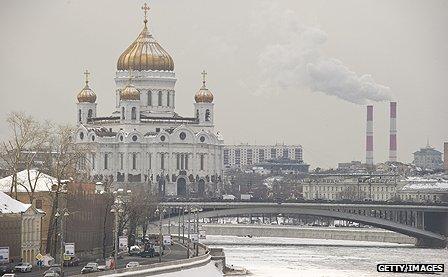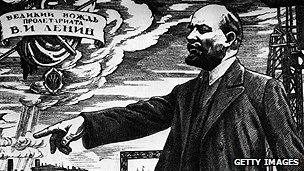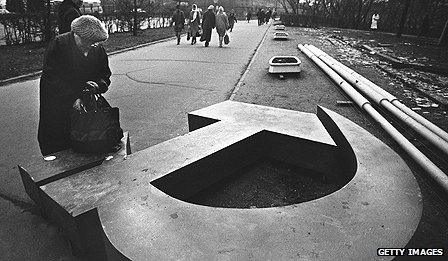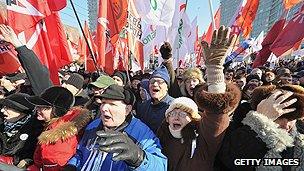Russia profile - Timeline
- Published
A chronology of key events:
9th century - Founding of Kievan Rus, the first major East Slavic state. The traditional account, a matter of debate among historians, attributes its founding to the semi-legendary Viking (or Varangian) leader Oleg, ruler of Novgorod, who went on to seize Kiev, which owing to its strategic location on the Dnieper River, became the capital of Kievan Rus.
10th century - Rurik dynasty established and the rule of Prince Vladimir the Great (Prince Volodymyr in Ukrainian) heralds start of a golden age. In 988 Vladimir accepts Orthodox Christianity and begins conversion of Kievan Rus to the Byzantine rite, thus setting the course for Christianity in the east.
11th century - Kievan Rus reaches its peak under Yaroslav the Wise (grand prince 1019-1054), with Kiev becoming eastern Europe's chief political and cultural centre.
Mongol domination
1237-40 - Mongols invade the Rus principalities, destroying numerous cities and ending Kiev's power. Tatars (as the Mongol invaders became known) establish the empire of the Golden Horde in southern Russia and the Khan of the Golden Horde becomes overlord of all the Russian princes.

Moscow has a population of more than 10 million people
14th century - Ascendancy of grand princes of Moscow (or Muscovy) under the Mongols. Ivan I is granted the title of Grand Prince after helping to defeat an anti-Tatar uprising in the principality of Tver, Moscow's great rival.
15th century - The Muscovite princes pursue a policy of "gathering the Russian lands", a drive to annex all East Slavic lands. Ivan III (the Great) subdues most of the Great Russian lands by conquest or by the voluntary allegiance of princes. The Battle of the Ugra in 1480 marks the end of Tatar dominance.
1547-84 - Grand Prince Ivan IV (the Terrible) is first ruler to be proclaimed Tsar in 1547. Seeking to impose military discipline and a centralised administration, he institutes a reign of terror against the hereditary nobility.
1581 - Cossacks begin conquering Siberia for Russia.
Romanovs
1613 - National Council elects Michael Romanov as tsar, ending a long period of instability and foreign intervention. Romanov dynasty rules Russia until 1917 revolution.
1689-1725 - Peter the Great introduces far-reaching reforms, including a regular conscript army and navy, subordinating the Orthodox Church to himself and reorganising government structures along European lines.
1721 - Russia acquires territory of modern Estonia and Latvia after decades of war with Sweden, establishing naval presence in Baltic Sea and 'window on Europe'.
1772-1814 - Russia conquers Crimea, Ukraine, Georgia, and what later became Belarus, Moldova, as well as parts of Poland.
1798-1815 - Russia takes part in the European coalitions against Revolutionary and Napoleonic France, defeating Napoleon's invasion in 1812 and contributing to his overthrow.
Army officers return home bringing liberal ideas from Europe, spurring efforts to rein in Romanov autocracy.
1825 - Abortive attempt by liberal army officers to establish constitutional government crushed in Decembrist Revolt.
1834-59 - Russia faces determined resistance to their bid to annex North Caucasus.
1853-57 - Russia suffers setback in attempt to seize territory from declining Ottoman Empire through its defeat in Crimean War.
1861 - Emancipation Edict ends serfdom but keeps peasants tied to the land through continuing labour obligations; rapid industrialisation leads to growth of a small working class and the spread of revolutionary ideas.
1864-65 - Kazakh steppes and Central Asian Muslim states annexed.
1877-78 - Russian-Turkish War sees Russia seize land from Ottoman Empire in the Caucasus and establish client states in the Balkans.
1897 - Marxist Social Democratic Party founded, and in 1903 splits into Menshevik and more radical Bolshevik factions.
1904-05 - Russian expansion in Manchuria leads to war with Japan - and the 1905 revolution, which forced Tsar Nicholas II to grant a constitution and establish a parliament, the Duma.
1906-1911 - Constitutional rule in tempered by authoritarian government of Peter Stolypin, whose attempts to reform land ownership were only partly successful.
1914 - Russian-Austrian rivalry in Balkans contributes to outbreak of World War I, in which Russia fought alongside Britain and France.
Rise of the Soviet Union

Lenin, who masterminded the Bolshevik take-over of power in Russia in 1917
1917 March - Poor performance in the war and mismanagement of the economy at home prompt mutinies in the armed forces and street disturbances in major cities.
Liberal leaders force Tsar Nicholas to abdicate; series of Provisional Governments seek to continue war against Germany despite disintegrating military and unrest at home.
November - Bolsheviks overthrow provisional government, suppress elected Constituent Assembly, establish ruthless 'Dictatorship of the Proletariat' under Communist Party rule that crushes religious and political dissent.
1918 - Treaty of Brest-Litovsk ends war with Germany at price of major territorial losses in eastern Europe and Baltic, which are steadily recovered over following 30 years.
1918-22 - Bolsheviks win civil war against White Russians, aided by Britain, France, Japan and the US. Defeat in war with Poland ends Soviet expansion westwards until the Second World War.
Stalin Ascendant

End of an era: After the collapse of the Soviet Union, Russia abandoned Communism, symbolised by the hammer and sickle
1922 - Bolsheviks reorganise remnants of Russian Empire as Union of Soviet Socialist Republics.
1920s - Experiments with market mechanisms and private business under New Economic Policy give way to state-run command economy under Joseph Stalin, who becomes virtually unchallenged as dictator in 1929.
Social permissiveness and relatively generous approach to minority nationalities gradually yield to a conservative and Russocentric policies.
1930s - Stalin carries out a second revolution to consolidate his power, concentrating land ownership in massive state-run holdings, forcing the pace of industrialisation, and killing his enemies - real and imagined - in the Party, economic management, civil service, military and security services.
Economic disruption and deliberate policy of repression leads of mass famine in Ukraine and deportation of hundreds of thousands of people to work in huge network of forced labour camps, usually in remote and harsh parts of the country.
1939 - Stalin concludes non-aggression pact with Nazi Germany, seizing eastern Poland, parts of Romania and Czechoslovakia, and then the Baltic States after the start of the Second World War.
1939-40 - Inconclusive Winter War against Finland reveals poor state of Soviet armed forces, prompting Stalin to build up military in expectation of eventual war with Germany.
1941 - Soviet Union left reeling by surprise German attack in July. German advance only halted on outskirts of Moscow in December. Soviet Union forms alliance with Britain and United States, who provide it with military supplies throughout rest of war.
1942 - Soviet military steadily pushes back German forces after Battle of Stalingrad.
1945 - Allied victory over Nazi Germany followed by swift establishment of Soviet hegemony in Central and Eastern Europe, and Balkans.
The annexations of 1939-40 are retained, client governments are formed elsewhere, and parts of Germany and Austria are occupied. Stalin extends policy of heavy industrialisation into these areas.
Cold War
1947 - 'Cold War' with the West begins in earnest as Soviet Union consolidates power in Eastern Europe and promotes pro-Soviet revolution in China, the Middle and Near East, and Asia.
1949 - Soviets explode their first nuclear bomb; Cold War rivals begin nuclear arms race.
1950s - Soviet competition for power with West extends into Latin America and former European colonies in Africa, making Cold War global.
1953 - Death of Stalin ushers in less repressive rule at home, although Communist Party political dominance is firmly upheld.
1957 - Soviet artificial satellite Sputnik becomes first to orbit Earth, spurring the Cold War beyond the atmosphere in a Space Race.
1961 - Yuri Gagarin becomes first person to orbit Earth in Vostok spacecraft.
1962 - Cuban Missile Crisis brings world to brink of nuclear war; perceived defeat for Soviet leader Nikita Khrushchev hastened his ouster two years later by more conservative faction, eventually led by Leonid Brezhnev.
Stagnation
1965-1970 - Prime Minister Alexei Kosygin tries to introduce profit and bonus elements and some decentralisation of planning in order to boost flagging economic output and competitiveness, but is thwarted by disappointing results and opposition by Party conservatives.
1970s - Consolidation of Leonid Brezhnev's rule sees economic stagnation and widespread corruption, undermining public faith in any superiority of the Soviet model.
Efforts to rein in Cold War tensions through US-Soviet detente collapse in aftermath of Soviet occupation of Afghanistan in 1979.
1985-91 - Rise to power of Mikhail Gorbachev heralds serious efforts to reform moribund economy (perestroika), free up political debate (glasnost), and end crippling cost of continuing Cold War.
Gorbachev gradually loses control of reform processes at home and abroad, leading to the collapse of Communist rule in Eastern Europe and the eventual implosion of the Soviet Union itself.
Yeltsin era
1991 - Russia becomes independent as the Soviet Union collapses and, together with Ukraine and Belarus, forms the Commonwealth of Independent States, which is eventually joined by most former Soviet republics except the Baltic states.
Chechnya declares unilateral independence, beginning a decade of conflict with Moscow.
1992 - Russia takes up the seat of the former Soviet Union on the United Nations Security Council, and retains control of its nuclear arsenal.
Acting Prime Yegor Gaidar launches controversial programme of lifting central controls on economy to prevent total collapse.
Opponents complain it is poorly managed and directly responsible for hyper-inflation and the rise of the 'oligarchs' - businessmen who benefit from crash privatisation of massive state enterprises.
1993 September-October - President Boris Yeltsin sends in troops to seize parliament from opponents of his rule.
1993 December - Referendum approves new constitution giving president sweeping powers.
Communist and nationalist opposition makes large gains in elections to new Duma parliament.
1994 - Russia joins Nato's Partnership for Peace programme.
Russian troops launch two-year to recapture the breakaway republic of Chechnya, which ends with compromise agreement on substantial Chechen autonomy.
1995 - Communist Party emerges as largest party in parliamentary elections, with more than a third of seats.
1996 - Yeltsin re-elected despite concerns about his health.
Russia admitted to the G-7 group of industrialised countries. Suspended in March 2014.
Yeltsin's twilight years
1998 September - New Prime Minister Yevgeny Primakov stabilises collapsing rouble, ends danger of debt default, and carries out major taxation reform.
Also opposes Nato campaign against Yugoslavia, marking start of Russia's distancing itself from US foreign policy. He eventually falls out with President Yeltsin, who dismisses him in May 1999.
1999 August - Armed men from Chechnya invade the neighbouring Russian territory of Dagestan.
President Yeltsin appoints ex-KGB officer Vladimir Putin prime minister with brief to bring Chechnya back under control.
1999 December - Yeltsin resigns in favour of Vladimir Putin, who takes over buoyed by popularity over major military campaign against Chechen rebels.
Putin asserts control
2000 March - President Putin wins election.
2000 August - Mr Putin faces criticism over sinking of Kursk nuclear submarine, given his slow response and official obfuscation.
2000 December - Mr Putin begins steady process of rehabilitating Soviet era by re-instating 1944-1991 anthem with new words.
2002 May - Russia and the USA announce a new agreement on strategic nuclear weapons reduction.
Russian and Nato foreign ministers set up Nato-Russia Council with equal role in decision-making on terrorism and other security threats.
2002 October - Chechen rebels seize a Moscow theatre and hold about 800 people hostage. Most of the rebels and around 120 hostages are killed when Russian forces storm the building.
2003 June - Government axes last remaining nationwide independent TV channel, TVS, citing financial reasons.
2003 September - Kyrgyzstan grants Russia first military base abroad in 13 years to counter Islamist terrorism.
2003 October - Yukos oil boss and prominent liberal Mikhail Khodorkovsky arrested on charges of tax evasion and fraud, an early casualty of President Putin's campaign to drive Yeltsin-era 'oligarchs' out of politics. In 2005 he is sentenced to nine years imprisonment, and is pardoned and goes into exile in 2013.
2003 December - President Putin's United Russia wins landslide Duma election victory, buoyed by economic recovery.
Squeeze on oligarchs
2004 March - Mr Putin wins second presidential term by landslide, consolidating his power.
2004 August - Authorities seize Yuganskneftegaz, Yukos's key production unit, over alleged tax debts, in move widely seen as punishment for Yukos boss Khodorkovsky's opposition to Putin. State formally purchases Yuganskneftegaz in December.
2004 September - More than 380 people, many of them children, killed when mainly Chechen and Ingush Islamists besiege school in North Ossetia's Beslan. Prompts boost in state security powers, despite widespread public criticism of handling of siege.
Mr Putin scraps direct election of regional governors, who will henceforth be government appointees.
2005 February - Moscow and Tehran sign agreement by which Russia will supply fuel for Iran's Bushehr nuclear reactor and Iran will send spent fuel rods back to Russia.
2005 March - Chechen separatist leader Aslan Maskhadov killed by Russian forces.
2005 June - State gains control of Gazprom gas giant by increasing its stake in the company to over 50%.
2005 September - Russia and Germany sign major deal to build Nord Stream gas pipeline under Baltic Sea between the two countries. Comes on line in 2011.
2006 January - Putin signs law giving authorities extensive new powers to monitor the activities of non-governmental organisations and suspend them if they are found to pose an alleged threat to national security.
2006 July - Russia's most-wanted man, Chechen warlord Shamil Basayev, killed by security forces.
2006 November - Former Russian security service officer Alexander Litvinenko, an outspoken critic of the Kremlin living in exile in London, dies of polonium poisoning. Britain accuses Russian former security officers of murder.
2007 March - Dozens detained as riot police break up St Petersburg protest by demonstrators accusing President Putin of stifling democracy.
Row with Britain
2007 July - Diplomatic row between London and Moscow over Britain's bid for the extradition of Andrei Lugovoi, an ex-KGB agent accused of Mr Litvinenko's murder.
2007 August - Russia mounts an Arctic expedition apparently aimed at expanding its territorial claims and plants a flag on the seabed at the North Pole.
2007 November - President Putin signs law suspending Russia's participation in the 1990 Conventional Armed Forces in Europe treaty that limits the deployment of heavy military equipment across Europe.
2007 December - President Putin's United Russia party wins landslide in parliamentary elections, which critics describe as neither free nor democratic.
2008 January - Russia revives Soviet-era Atlantic navy exercises in neutral waters in the Bay of Biscay off France in demonstration of resurgent military muscle.
2008 March - Putin ally Dmitry Medvedev wins presidential elections as Mr Putin cannot serve a third consecutive term, later appoints Mr Putin prime minister.
War with Georgia
2008 August - Tensions with Georgia escalate into war after Georgian troops attack Russian-backed separatist forces in South Ossetia. Russia drives Georgian forces from South Ossetia and Abkhazia, then recognizes both as independent states.
2008 November - Parliament votes overwhelmingly in favour of a bill that would extend the next president's term of office from four to six years.
2009 January - Russia stops gas supplies to Ukraine after the collapse of talks to resolve a row over unpaid bills. Supplies to southeastern Europe are disrupted for several weeks as a result of the dispute.
2009 April - Russia formally ends operations against rebels in Chechnya, although sporadic violence continues.
Thaw with US
2009 July - President Medvedev and Barack Obama, on his first official visit to Moscow, reach an outline agreement to reduce nuclear weapons stockpiles in move aimed at replacing 1991 Start 1 treaty.
2009 September - Russia welcomes the US decision to shelve missile defence bases in Poland and the Czech Republic.
2009 October - Opposition parties accuse the authorities of rigging local elections, as the governing United Russia party wins every poll by a wide margin.
2010 April - President Medvedev signs a new strategic arms agreement with US committing both sides to cut arsenals of deployed nuclear warheads by about 30 percent.
2010 June - Presidents Medvedev and Obama mark warming in ties on the Russian leader's first visit to the White House. Obama says the US will back Russia's World Trade Organisation accession, and Russia will allow the US to resume poultry exports.
2010 July - A customs union between Russia, Belarus and Kazakhstan comes into force despite Belarusian complaints about Russia retaining duties on oil and gas exports to its neighbours.
2010 October - President Medvedev sacks the powerful mayor of Moscow, Yuri Luzhkov, after weeks of criticism from the Kremlin. Mr Luzhkov had been in office since 1992.

Vladimir Putin faced protests after his 2012 re-election, but moved to stifle opposition
2011 December - United Russia suffers drop in share of the vote at parliamentary elections, but keeps a simple majority in the State Duma. Tens of thousands turn out in opposition protests alleging fraud, in first major anti-government protests since the early 1990s.
Putin's second presidency
2012 March - Vladimir Putin wins presidential elections. Opponents take to the streets of several major cities to protest at the conduct of the election, police arrest hundreds.
2012 July - Law goes into force requiring non-governmental organisations receiving funds from abroad to be classed as "foreign agents" as part of a wider crackdown on dissent.
2012 August - US, EU and human rights groups condemn jail sentences imposed on three members of punk band Pussy Riot over an anti-Putin protest in a Moscow cathedral. The women were sentenced to two years for "hooliganism".
Russia formally joins the World Trade Organization after 18 years of negotiations.
2012 December - Angered by a US bill blacklisting Russian officials in connection with the death in custody of lawyer Sergei Magnitsky, Moscow bans Americans from adopting Russian children and stops US-funded non-governmental organisations from working in Russia.
Crackdown continues
2013 July - Anti-corruption blogger and leading opposition activist Alexei Navalny is sentenced to five years in prison after being found guilty of embezzlement in a trial he rejects as politically motivated.
2013 September - Mr Navalny comes second in the Moscow mayoral election after being released pending appeal, coming close to forcing the Kremlin's candidate into a run-off.
Ukraine crisis
2014 February-May - After flight from Ukraine of pro-Moscow president Viktor Yanukovych, Russian forces take over Crimea, which then votes to join Russia in a referendum. This sparks biggest East-West showdown since Cold War, with the US and its European allies criticising Russia's further intervention in eastern Ukraine. Russia suspended from G-8 group of industrialised countries.
2014 May - Russia's Gazprom sign 30-year deal to supply the China National Petroleum Corp with gas, estimated to be worth over $400bn.
2014 July - Following the downing of a Malaysian Airlines passenger plane over eastern Ukraine in a suspected missile strike, Russia comes in for international criticism over supplying rebels with heavy weaponry.
The EU and US announce new sanctions against Russia. The IMF says Russian growth is slowing down to zero.
2014 October - Russia agrees to resume gas supplies to Ukraine over the winter in a deal brokered by the EU.
2014 December - The Russian rouble begins to drop rapidly against the US dollar, losing about half its value in the next two months.
2015 February - Opposition activist and former first deputy prime minister Boris Nemtsov is shot dead in Moscow. Police charge two Chechens with murder amid widespread scepticism.
Syria intervention
2015 September - Russia carries out first air strikes in Syria, saying it targets the Islamic State group. But West and Syrian opposition say it overwhelmingly targets anti-Assad rebels instead.
2015 November - Turkey shoots down Russian warplane on Syria bombing mission. Russia, Turkey's second-largest trading partner, imposes economic sanctions.
2016 January - British public inquiry concludes President Putin probably approved murder of of former Russian intelligence officer and Kremlin critic Alexander Litvinenko in London in 2006.
2016 September - Parliamentary elections: The ruling United Russia party increases its majority, with the remaining seats won by other pro-Putin parties. Key opposition figures such as Alezei Navalny barred from standing.
2017 April - A bomb attack on the St Petersburg metro rail system kills 13 people.
2017 June - EU extends sanctions against Russia for another six months over the conflict in eastern Ukraine.
2017 July-September - The US and Russia engage in a tit-for-tat involving hundreds of diplomatic staff after the US Congress approved new sanctions for Russia's alleged meddling in the 2016 presidential election.
2017 December - The International Olympic Committee bans Russia from competing in the 2018 Winter Olympics.
2018 March - Diplomatic row with Britain over the poisoning of former spy Sergei Skripal and his daughter Yulia in Salisbury, which Britain pins firmly on Russia. British allies join London in imposing further sanctions on Russia, including the United States in August.
Constitutional plans
2018 May - Vladimir Putin inaugurated for fourth term as president after beating minor candidates in the March election.
2018 July - President Putin and his US counterpart Donald Trump play down reports of Russian meddling in the 2016 US presidential election at their summit meeting in Helsinki.
2019 April - President Putin gives North Korean leader Kim Jong-un support for security guarantees ahead of any nuclear disarmament at a meeting in the far-eastern city of Vladivostok.
2020 January - President Putin announces plans to change the constitution ahead of the end of his presidential term in 2024, and dismisses the government.
Former tax service chief Mikhail Mishustin appointed prime minister, succeeding Mr Putin's long-time ally Dmitry Medvedev.
2020 August - German doctors treating Russian opposition politician Alexei Navalny conclude that he was poisoned with a Novichok nerve agent.